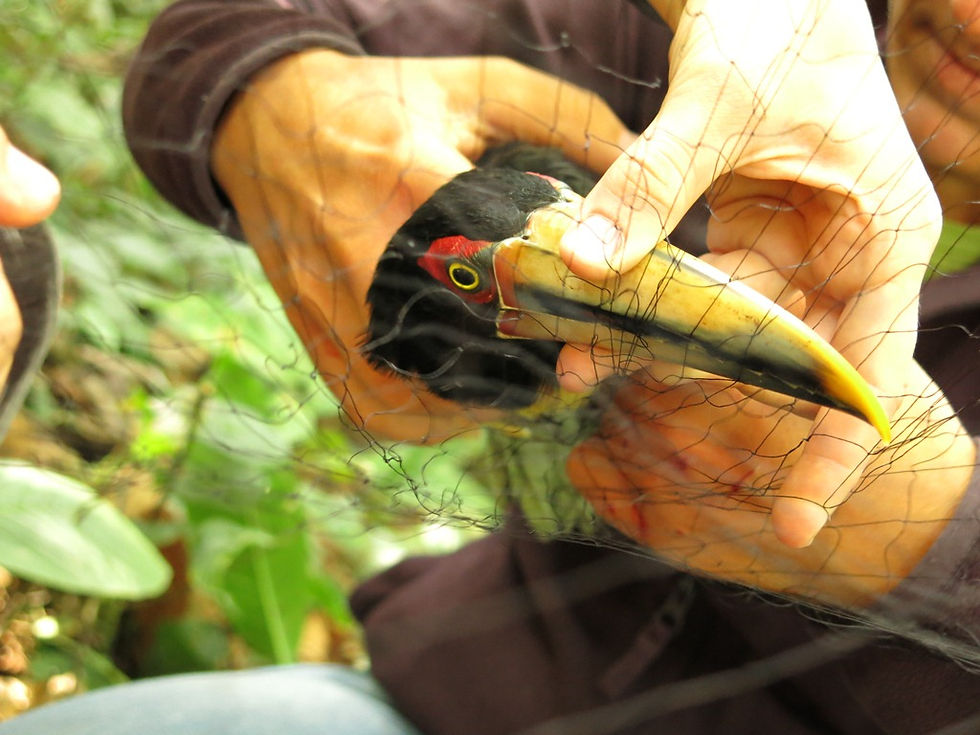Nature Reserve & Biological Station
Tropical Biology Internship
Wildlife Monitoring, Rainforest Ecology & Conservation
Overview
Join our team at Un poco del Chocó for a hands-on biology internship in one of the world’s most biodiverse and endangered ecosystems. Interns contribute directly to real-world conservation and ecological research in the tropical rainforest of the Andean Chocó. Through fieldwork, data analysis, and active involvement in reserve management, you’ll gain both theoretical and practical knowledge in tropical biology and conservation science.
Whether you're building experience for a future in biology, environmental sciences, or conservation, this internship offers a unique opportunity to develop field skills, deepen your ecological understanding, and make a meaningful impact.
What You'll Do
Research projects
IInterns assist with field data collection, management, and analysis across our long-term monitoring and research initiatives:
-
Avian Research and Bird Monitoring
Assist with mist-netting, bird banding, morphological measurements, and bird surveys. You’ll be trained by NABC-certified bird banders. -
Lepidopteran Project
Set up bait traps, collect and identify butterflies to monitor species diversity in the reserve. -
Camera Trap Project
Help document mammals and ground-dwelling birds using camera traps. Tasks include setup, maintenance, and species identification from footage. -
Flower and Fruit Phenology
Conduct monthly surveys to track fruiting and flowering patterns and resource availability in the forest. -
Bat Monitoring (January–March)
Interns set up mistnets and assist in in data collection on captured bats -
Herpetofauna Monitoring (January–March)
Participate in night surveys to document amphibians and reptiles, assisting in data collection on species diversity and physical traits. -
Support for Visiting Researchers
Assist other researchers and students with fieldwork and data processing. -
Data management (data entry and analysis)
Reserve management and conservation
In addition to research, interns engage in monthly conservation efforts that directly support the reserve’s ecological mission:
-
Trail maintenance
Maintain and improve the reserve’s nature trails and signage. -
Reforestation project
Collect seeds from native tree species for our tree nursery, care for saplings and lend a hand in our reforestation project. -
Forest school project
Help develop and deliver workshops for local students to raise environmental awareness. -
Outreach
Create content for our blog and social media to share updates from the field.

For detailed studies of the bird communities in the reserve we are running a long-term monitoring project, combining constant-effort mistnetting and bird censuses.

At three different locations in the reserve, we capture mainly passerines, but also other birds like toucans, motmots and woodpeckers.

When the saplings are big enough we plant them on neighboring properties where we are helping to reforest abandoned cattle fields.

For detailed studies of the bird communities in the reserve we are running a long-term monitoring project, combining constant-effort mistnetting and bird censuses.
What We Expect
We’re looking for enthusiastic, adaptable individuals who are passionate about nature and conservation. This internship is ideal for those who are ready to immerse themselves in fieldwork—rain or shine—and who are comfortable living and working in a communal, off-grid setting.
Interns typically contribute 5 hours per day on weekdays. Afternoons and weekends are usually free, though some flexibility is required. A reasonable level of physical fitness is essential, and we ask all participants to be respectful, tidy, and open to shared living.
Who can apply?
We welcome applicants aged 18+ from all backgrounds. While prior field experience is not required, a background in biology, environmental science, wildlife studies, or related fields is a plus. Familiarity with birds, fieldwork tools (Excel, R, GIS), or Spanish is also helpful—but not mandatory, as all interns receive on-site training.
2026 Internship fees
A Tropical Biology Internship can last between 4 and 12 weeks. Students who are interested in completing a longer internship may continue with an individual research project as part of a Research Traineeship.
Fees vary depending on the length of stay:
Duration of stay Fees in US $
4 weeks 1800 $
5 - 8 weeks 1800 $ + 400 $ /week (5-8)
9 - 12 weeks 3400 $ + 350 $ /week (9-12)
What's included?
-
Three daily meals
-
Lodging in a shared double room (bunk beds)
-
Full access to research equipment, laboratory, and station facilities
-
WiFi access
-
Supervision and mentorship by professionals
-
Project permits and training
-
Contribution to the station’s long-term research and conservation efforts
What's not included?
-
International travel (airfare, visa, travel insurance)
-
Transport to/from the reserve
-
Personal expenses (snacks, bottled drinks, laundry service, weekend trips)
Ready to Join Us?
This is more than just an internship—it's a chance to contribute to meaningful science, live immersed in the rainforest, and be part of a passionate team working to protect one of the planet’s last remaining biodiversity hotspots.
2026 Start Dates
Internships begin on the following dates:
-
January 5
-
August 11
We learned a lot about the wonders of the rainforest ecosystem and will never forget the wonderful time we had...
"
Peggy & Nora, Germany












